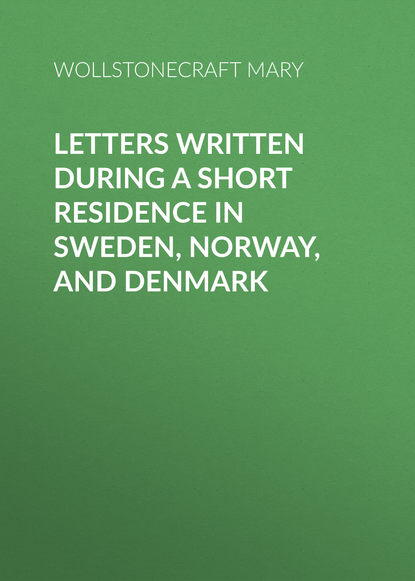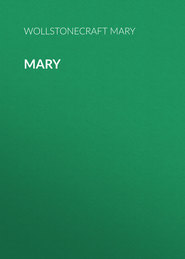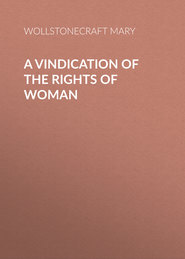По всем вопросам обращайтесь на: info@litportal.ru
(©) 2003-2024.
✖
Letters Written During a Short Residence in Sweden, Norway, and Denmark
Настройки чтения
Размер шрифта
Высота строк
Поля
Travelling in Sweden is very cheap, and even commodious, if you make but the proper arrangements. Here, as in other parts of the Continent, it is necessary to have your own carriage, and to have a servant who can speak the language, if you are unacquainted with it. Sometimes a servant who can drive would be found very useful, which was our case, for I travelled in company with two gentlemen, one of whom had a German servant who drove very well. This was all the party; for not intending to make a long stay, I left my little girl behind me.
As the roads are not much frequented, to avoid waiting three or four hours for horses, we sent, as is the constant custom, an avant courier the night before, to order them at every post, and we constantly found them ready. Our first set I jokingly termed requisition horses; but afterwards we had almost always little spirited animals that went on at a round pace.
The roads, making allowance for the ups and downs, are uncommonly good and pleasant. The expense, including the postillions and other incidental things, does not amount to more than a shilling the Swedish mile.
The inns are tolerable; but not liking the rye bread, I found it necessary to furnish myself with some wheaten before I set out. The beds, too, were particularly disagreeable to me. It seemed to me that I was sinking into a grave when I entered them; for, immersed in down placed in a sort of box, I expected to be suffocated before morning. The sleeping between two down beds—they do so even in summer—must be very unwholesome during any season; and I cannot conceive how the people can bear it, especially as the summers are very warm. But warmth they seem not to feel; and, I should think, were afraid of the air, by always keeping their windows shut. In the winter, I am persuaded, I could not exist in rooms thus closed up, with stoves heated in their manner, for they only put wood into them twice a day; and, when the stove is thoroughly heated, they shut the flue, not admitting any air to renew its elasticity, even when the rooms are crowded with company. These stoves are made of earthenware, and often in a form that ornaments an apartment, which is never the case with the heavy iron ones I have seen elsewhere. Stoves may be economical, but I like a fire, a wood one, in preference; and I am convinced that the current of air which it attracts renders this the best mode of warming rooms.
We arrived early the second evening at a little village called Quistram, where we had determined to pass the night, having been informed that we should not afterwards find a tolerable inn until we reached Stromstad.
Advancing towards Quistram, as the sun was beginning to decline, I was particularly impressed by the beauty of the situation. The road was on the declivity of a rocky mountain, slightly covered with a mossy herbage and vagrant firs. At the bottom, a river, straggling amongst the recesses of stone, was hastening forward to the ocean and its grey rocks, of which we had a prospect on the left; whilst on the right it stole peacefully forward into the meadows, losing itself in a thickly-wooded rising ground. As we drew near, the loveliest banks of wild flowers variegated the prospect, and promised to exhale odours to add to the sweetness of the air, the purity of which you could almost see, alas! not smell, for the putrefying herrings, which they use as manure, after the oil has been extracted, spread over the patches of earth, claimed by cultivation, destroyed every other.
It was intolerable, and entered with us into the inn, which was in other respects a charming retreat.
Whilst supper was preparing I crossed the bridge, and strolled by the river, listening to its murmurs. Approaching the bank, the beauty of which had attracted my attention in the carriage, I recognised many of my old acquaintance growing with great luxuriance.
Seated on it, I could not avoid noting an obvious remark. Sweden appeared to me the country in the world most proper to form the botanist and natural historian; every object seemed to remind me of the creation of things, of the first efforts of sportive nature. When a country arrives at a certain state of perfection, it looks as if it were made so; and curiosity is not excited. Besides, in social life too many objects occur for any to be distinctly observed by the generality of mankind; yet a contemplative man, or poet, in the country—I do not mean the country adjacent to cities—feels and sees what would escape vulgar eyes, and draws suitable inferences. This train of reflections might have led me further, in every sense of the word; but I could not escape from the detestable evaporation of the herrings, which poisoned all my pleasure.
After making a tolerable supper—for it is not easy to get fresh provisions on the road—I retired, to be lulled to sleep by the murmuring of a stream, of which I with great difficulty obtained sufficient to perform my daily ablutions.
The last battle between the Danes and Swedes, which gave new life to their ancient enmity, was fought at this place 1788; only seventeen or eighteen were killed, for the great superiority of the Danes and Norwegians obliged the Swedes to submit; but sickness, and a scarcity of provision, proved very fatal to their opponents on their return.
It would be very easy to search for the particulars of this engagement in the publications of the day; but as this manner of filling my pages does not come within my plan, I probably should not have remarked that the battle was fought here, were it not to relate an anecdote which I had from good authority.
I noticed, when I first mentioned this place to you, that we descended a steep before we came to the inn; an immense ridge of rocks stretching out on one side. The inn was sheltered under them; and about a hundred yards from it was a bridge that crossed the river, the murmurs of which I have celebrated; it was not fordable. The Swedish general received orders to stop at the bridge and dispute the passage—a most advantageous post for an army so much inferior in force; but the influence of beauty is not confined to courts. The mistress of the inn was handsome; when I saw her there were still some remains of beauty; and, to preserve her house, the general gave up the only tenable station. He was afterwards broke for contempt of orders.
Approaching the frontiers, consequently the sea, nature resumed an aspect ruder and ruder, or rather seemed the bones of the world waiting to be clothed with everything necessary to give life and beauty. Still it was sublime.
The clouds caught their hue of the rocks that menaced them. The sun appeared afraid to shine, the birds ceased to sing, and the flowers to bloom; but the eagle fixed his nest high amongst the rocks, and the vulture hovered over this abode of desolation. The farm houses, in which only poverty resided, were formed of logs scarcely keeping off the cold and drifting snow: out of them the inhabitants seldom peeped, and the sports or prattling of children was neither seen or heard. The current of life seemed congealed at the source: all were not frozen, for it was summer, you remember; but everything appeared so dull that I waited to see ice, in order to reconcile me to the absence of gaiety.
The day before, my attention had frequently been attracted by the wild beauties of the country we passed through.
The rocks which tossed their fantastic heads so high were often covered with pines and firs, varied in the most picturesque manner. Little woods filled up the recesses when forests did not darken the scene, and valleys and glens, cleared of the trees, displayed a dazzling verdure which contrasted with the gloom of the shading pines. The eye stole into many a covert where tranquillity seemed to have taken up her abode, and the number of little lakes that continually presented themselves added to the peaceful composure of the scenery. The little cultivation which appeared did not break the enchantment, nor did castles rear their turrets aloft to crush the cottages, and prove that man is more savage than the natives of the woods. I heard of the bears but never saw them stalk forth, which I was sorry for; I wished to have seen one in its wild state. In the winter, I am told, they sometimes catch a stray cow, which is a heavy loss to the owner.
The farms are small. Indeed most of the houses we saw on the road indicated poverty, or rather that the people could just live. Towards the frontiers they grew worse and worse in their appearance, as if not willing to put sterility itself out of countenance. No gardens smiled round the habitations, not a potato or cabbage to eat with the fish drying on a stick near the door. A little grain here and there appeared, the long stalks of which you might almost reckon. The day was gloomy when we passed over this rejected spot, the wind bleak, and winter seemed to be contending with nature, faintly struggling to change the season. Surely, thought I, if the sun ever shines here it cannot warm these stones; moss only cleaves to them, partaking of their hardness, and nothing like vegetable life appears to cheer with hope the heart.
So far from thinking that the primitive inhabitants of the world lived in a southern climate where Paradise spontaneously arose, I am led to infer, from various circumstances, that the first dwelling of man happened to be a spot like this which led him to adore a sun so seldom seen; for this worship, which probably preceded that of demons or demigods, certainly never began in a southern climate, where the continual presence of the sun prevented its being considered as a good; or rather the want of it never being felt, this glorious luminary would carelessly have diffused its blessings without being hailed as a benefactor. Man must therefore have been placed in the north, to tempt him to run after the sun, in order that the different parts of the earth might be peopled. Nor do I wonder that hordes of barbarians always poured out of these regions to seek for milder climes, when nothing like cultivation attached them to the soil, especially when we take into the view that the adventuring spirit, common to man, is naturally stronger and more general during the infancy of society. The conduct of the followers of Mahomet, and the crusaders, will sufficiently corroborate my assertion.
Approaching nearer to Stromstad, the appearance of the town proved to be quite in character with the country we had just passed through. I hesitated to use the word country, yet could not find another; still it would sound absurd to talk of fields of rocks.
The town was built on and under them. Three or four weather-beaten trees were shrinking from the wind, and the grass grew so sparingly that I could not avoid thinking Dr. Johnson’s hyperbolical assertion “that the man merited well of his country who made a few blades of grass grow where they never grew before,” might here have been uttered with strict propriety. The steeple likewise towered aloft, for what is a church, even amongst the Lutherans, without a steeple? But to prevent mischief in such an exposed situation, it is wisely placed on a rock at some distance not to endanger the roof of the church.
Rambling about, I saw the door open, and entered, when to my great surprise I found the clergyman reading prayers, with only the clerk attending. I instantly thought of Swift’s “Dearly beloved Roger,” but on inquiry I learnt that some one had died that morning, and in Sweden it is customary to pray for the dead.










